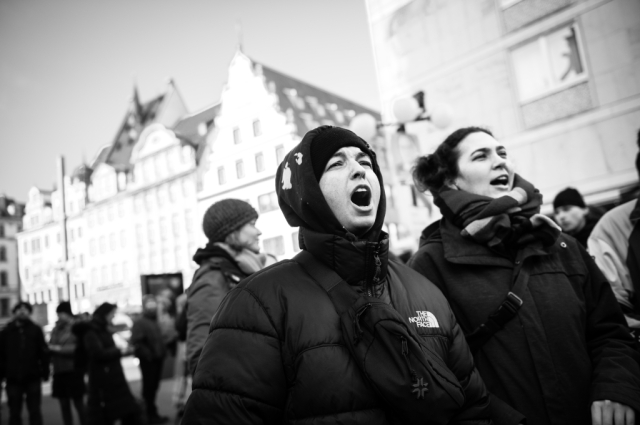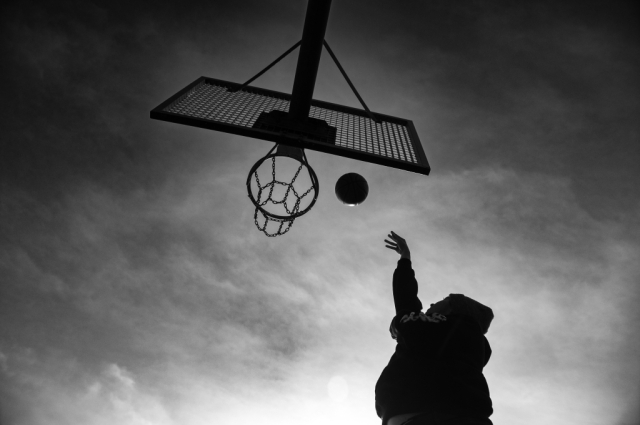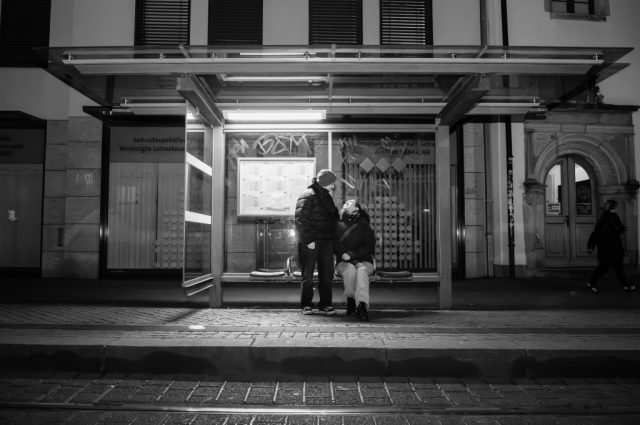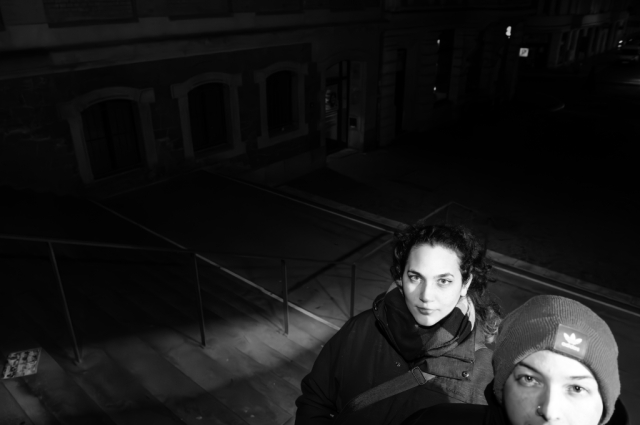Gabriel Demiri, Germany (he/him)
18 September 2025
Where are you from?
From Germany, but I was born in Poland.
Okay, what do you do in life?
I live! And I'm surviving - no, okay, fine. I work in a company, I am a production manager, we make things for electric cars and produce designs and write programs for various modules. Apart from that, I like games, I like to watch series, movies, I spend a lot of time with my wife, for me, that’s true quality time.
Can you tell me about your childhood... your father is Roma, yeah?
Oh, that was a whirlwind. Yeah, so I was born in Poland, although my parents met at a fair in Germany, so romantic. But the problem is that in Germany they were both there without a work visa and, because of that, they also had problems with the department for foreigners. My mother was deported to Poland while she was pregnant with me.
That's why I was born in Poland. And that's why I was deported four more times with my mother and brothers. My father was not allowed to leave the country, otherwise he would have come as well, because the department for foreigners was in this fashion [saying]: oh, you can't even go back to Macedonia, you have to stay in Germany, you can't leave the country, you have to suffer and wait for your family to come back. That in itself was painful, because as a child you don't really know what’s going on. I also went to school in Poland. It was fun in a way. I was seven years old, so it just felt weird.
Otherwise, it was difficult, because, apart from the fact that I was often in Poland and that, my mother had no relatives in Germany, so we lived with my father's family, who are Roma and also Muslim. And that means that I grew up with a Catholic mother, but I also grew up with a father who is a Roma Muslim, so I got to know both religions and the Roma culture and I actually grew up with it, but my father always said no, don't ever say you are Roma, you are not, because you are not a pure Roma. Even within the family it was, no, you are white, you are German, you only have to learn German.
And that's why my parents tried to teach me and my younger brothers German, rather than Romani or Macedonian or Polish, only German. Despite that, of course, I also spoke a lot of Romani with mamì [grandmother], and thanks to my grandparents in Poland, thanks to my schooling in Poland, I also spoke Polish, but unfortunately I don't have much contact with that anymore, which I'm very sorry about.
You were aware of your Roma heritage when you were little? Did you have any problems being Roma in Germany or in Poland?
Yes, in Poland it was... Well, my... I don't even know where to start.
Okay, my grandparents from Poland were not particularly enthusiastic about my father, because of course they also have a certain view of what the Roma are. For them, the Roma are dirty beggars, who bum around. So, practically, what everyone always sees, conmen who drifted? And that was a bit difficult for my mother. But of course, it was difficult for my mother to deal with the Roma as well.
I naturally knew that I was Roma. But my parents always said that I should keep it to myself. Be proud of it.
My mother used to tell me to be proud of who I was. But not to tell anyone, because as soon as you do, everyone will always think bad things about you.
Everyone will always say, uh, you must not be working, you must be begging, you are just stealing. They practically have no future here. But then, every time I would achieve something, because I consider that I have achieved very, very much in my life, despite this whole story, I am very proud to be Roma.
And whenever I would do something really great, which no one expected from me, I would be like: yes, and I'm Roma. Yeah.
Can we start to talk a bit about the personal stuff? When did you notice that, when you were a girl, yeah, that you don’t like boys, that you are, like, something different? Do you remember that?
Yes, I knew that from an extremely early age. I knew immediately. My father - my mother always says that my father is to blame, because when she was pregnant, he kept caressing her stomach and saying something to the effect of, my boy, my boy. And so, it happened... it happened later, but not at the beginning.
And for four years I was the only one before my other brother - I have two younger brothers, and until the first brother was born, I was an only child, my father did everything with me and it was so much fun, because then he didn't treat us differently, not really, and he took me everywhere, whether it was fishing, collecting bulky waste, repairing cars, driving, anything. Whatever interested me, he did it with me. Until my brothers were born - there is only a year difference between them - and then it was as if he cut me off.
And before that, until then, it wasn't like that - okay, I was only four years old, but again - I didn't think about it, like, girl, boy, whatever. I didn't even go to kindergarten, of course, here in Germany I was unregistered. So, in my vicinity I was the only child, maybe there were one or two other children in the neighbourhood.
But they were all foreigners too, so there were always ten of them or whatever. I didn't think about it. But then, when my brothers were born, I noticed that my father lost interest and very quickly made it clear to me that girls or women are not worth much.
At least I felt very worthless, and at first, I was confused, I was like, what is this? What's going on here? And soon after, a few years after that, when I went to school and became more interested in stereotypically boyish stuff, I noticed, ah, first of all, I like girls a lot, much more than boys, but I certainly don't want to be a girl. I didn't see myself that way, not even then. And whenever I met new kids, let's say I was eight or nine years old, I would say that, yeah, I'm just a boy with long hair, like Tarzan.
And I always gave that comparison, because my name was Kinga, and in Germany it didn't mean anything to anyone, they didn't know what that name was and often they didn't even believe that that was actually my name. In Poland, it's a typical name, almost every other person has that name, and it was just clear to me that I was not a girl and I definitely did not want to be a woman. Now, when I look back, I think it was actually a good thing that my father reacted so extremely, because I saw very quickly what I wanted and what I would be like in life.
But of course, all the other circumstances did not make it easier for me to come out. I knew that about myself, but I knew, that is, at that time I thought, that there was nothing I could do about it, that I could not change anything, in any case, I thought that I would be able to, later in life, be with a woman and be happy, but I never thought that I would ever be able to start the transition.
Can you tell me how your parents reacted when you...
Can we first talk about, when I said I was a lesbian? And then – because it’s a whole thing. I mean, of course, when I could not be a boy, then of course I wanted to be with a woman, that is, then I am before all else a lesbian. Unfortunately, I didn't have the luxury of being able to come out myself, actually, that is, I was outed by a relative, to whom I told this in confidence, we still got along well then, not anymore, I think I haven't seen him in ten years, thank God. And he betrayed me, so to speak. And my parents reacted very, very, very badly.
Okay, like this, when I was seventeen my cousin from Macedonia came here to Germany, that's when I saw him for the first time, and we actually hit it off right away, because, he was funny, we were peers and it was... He was with us all summer and it was actually really fun and I thought, man, great, I finally have a cousin who is so cool, and we spent a lot of time together, and then I thought that I could confide in him, so I told him, hey, you know, I love women and, since the family often talks about it, one day you will get married or sometimes they were married off, for example, my older cousin from Macedonia, he was married off and, yes, then we joked about it and I said, no, well, that’s gonna be difficult because I love women, and that was a drastic turning point, because he suddenly became very, very mean to me, and I somehow didn't realise it, what’s the problem now, I am still the same person, I already then...I realised, oh no, he's going to tell, I can't do this, because I would sometimes ask my father, hey, what would you say if Kai, that's my younger brother, said he was gay? Just to get a feel for the situation, to check what he thought, and he said, oh, then he wouldn't be my son, he wouldn't be my child, I wouldn't want to have anything to do with him.
So of course, I always knew, okay, my parents aren't ready for any kind of coming out, so of course I never said anything. At school everyone knew, it didn't bother me that much, but, yeah, at home it's always a different story and I told him, he was very angry and very mean and said, no, no way, no, you're not normal, no way, it can't be and I'll change it.
And I said, wait, what are you talking about, stop that shit. And then he was like, okay, if you don't want me to tell, then you have to do what I tell you, so I'll convert you.
I didn't understand at first, I thought, cousin, we are related, what do you want from me? What's wrong with you? And then for two years he regularly raped me and asked for pictures and videos and the like, and constantly - I mean, he had me completely in his grip, simply because I didn't want my parents to find out, until one time, when I was already nineteen years old, I said okay, I can't do this anymore, that’s enough.
I was often, I was already practicing a trade, I was often out of the house, because of the block of classes, I would spend a couple of weeks at a time at school, I met other people and I thought, okay, I need to regain control over my life, because it was around graduation, that's when he had complete control over me, and that's when I finally managed to get out and then I thought, you can do it, you will succeed, but unfortunately he beat me to it, I said, now I have to reveal everything, but he already did it and told my parents, not about the rapes, but that I was a lesbian, and obviously that was the worst thing that could have happened to my parents, because, they, they wanted to talk to me, it was a little before I went to the night shift, I actually wanted to go out, it was summer and my parents said let's go for a drive, I said okay, what did I know.
We had just left the village, we were in the woods, I was confused, what are we going to do in the forest, what is happening, and then my father turned the car off and asked if it was true and listed everything, and there were some strange things that were not true, but obviously he had wanted to screw with my life, as if he had not done it before, and then I said, yes, that's right, I'm a lesbian, that's right, and then my father, I was sitting in the passenger seat, beat me, he actually beat me, with his fists, everywhere, I was crying, my mother was screaming at me from the back seat, so instead of somehow stopping my father or whatever, she just let it happen and continued to yell at me about how could I do such a thing to my family, and all that, without even taking into account how it was for me... that it was terrible for me too, I mean, it's terrible enough that you're a teenager, and to have this happen to you as a teenager and having to keep it to yourself, and then being queer on top of that, it was simply... then graduation, which is additional mental stress, no one took that into account, my father then didn't talk to me for a year, whenever he saw me, he would say, how God had punished him and, yes... that he would prefer to see me hanging from a tree, than to deal with me and my issues.
I mean, not that he really dealt with it, but simply that he had to think about it. So, he would rather see me dead than to continue living like this. Yeah, so that was the first reaction, when I was nineteen.
Of course, then I moved out, I moved to Halle, because I met someone. I told that person that I was trans, because I thought why not. And I, once again, got a negative reaction from a person I trusted, something to the effect of, well no, don't do that, no one will love you, I'll leave you right away, that's not normal.
It's funny that, shortly after the breakup, that person also came out as trans, so it was probably just internalised transphobia. And then, later on, I met my now fiancée and that was it, we clicked. I didn't even have to come out, it was like ... she took it on for me and immediately helped me get started, quickly helped me go on hormone therapy and that was the best support I could have asked for.
And the feeling was so surreal, because it was the first time that someone wanted me for who I really was. And then, of course, one day I was driving to my parents, and it was, it went very smoothly, it wasn't terrible at all. I tried to make a joke - it was Mother's Day, and I gave my mother a mug that said: "No matter how hard life is, at least you don't have an ugly son."
And she understood immediately, my father did not, but then they both understood and reacted extremely calmly. My mother did cry, but she quickly got used to it, and now, she is used to my new name and pronoun. My father isn't really, but that's honestly not that important to me, because now, at this moment, I know that I could call him if I needed help or whatever, and he would come.
So, in any case, they have matured in their role as parents.
Did you have problems because you are Roma in the LGBTQ community?
Oh, okay, okay, I'll start over. So, while I was still living with my parents, of course, I wasn't looking for any kind of community, because I was all involved in myself, and then, when I moved to Halle, my partner, well, we were the only ones we knew who were queer, and that was it. Because my partner, my ex-partner, only had straight friends at the time and I accepted that circle of friends and so, for me too, I don't know, somehow, I didn't, I don't know if I can call it a need, but I didn't really have the opportunity or time to look for them. I wasn't even... All the time, it's now eight years since I've been in Halle, all the time I was in my previous relationship I never went to the Pride Parade, which is sad, because it's not small at all.
And it was only with Sophie, meaning my current fiancée, that I really found a queer community through a working group from the university in Halle, in which Sophie was a speaker and the co-organiser of a queer meeting. And that’s where, it was an initiative because of Covid, queer people could exchange experiences, meet, before of course it was online, then when they loosened the rules and guidelines a bit, then we also met outside, there is a nice park, we met there. And that's when I really saw, wow, there are so many of us who are queer and that was really nice.
I have to say that I didn't really have a problem as a Roma. It kind of didn't really bother anyone, to be honest, and yes of course there weren't many POCs [People of Colour], I was the only one and we tried of course to attract more POCs, but it never really worked.
But I have to say, it was still nice, that initiative is still there, and, yes, I'm definitely more queer now than I was before. You can - I mean, I have a lot more contact with queer people, and it's fantastic, it's completely enriched my life. I feel so confident and open about it.
Yeah, but so far, as I said, I have had no problems in those circles because I am Roma.
So, you are now transitioning, there was a second coming out, and now your family is with you, like, is it better, worse?
Well, actually, with my closest family, that is, with my parents and brothers, I actually have a very good relationship, I am there twice a month, with Sophie of course, sometimes we spend the weekend there and sometimes they come here.
Now that we have our own apartment, before, while we were sharing an apartment, it was of course difficult, now in our own apartment they come here from time to time, and that means we see each other regularly, we correspond, we talk on the phone, we also go to Poland to visit my grandfather and so, so, the relationship is good, in any case it is much, much better, night and day.
Do you have, like, any problems now because you are transitioning, are you profiled? As a woman or as a man, or ...?
At work I don't have a problem with that at all, because when I started the transition, I started a new job, that is, I immediately applied as a man and said, like this, I'm a man and these are my pronouns and everything, and it's completely fine for everyone there, they never questioned it, not even for a second, so I have a very, very good job, I really, I mean, I really love my job, they're, it's still a kind of startup company, they're very open and nice, but otherwise in public sometimes it's still very, very difficult, especially at the beginning, because I am, for example, I always say, I'm too pretty, but I understand why many people still see me as a woman, I don't have a particularly manly face, I'm not even tall, and I don't have a particularly strong beard. And the beard is a reflection of masculinity, of course, I would say that it is very, very difficult, but I have also noticed, now that my beard and sideburns have started to grow and my voice is also deeper than before, now I don't have those problems anymore.
And now with my name, since I changed my name, it doesn't even happen in emails anymore, and I used to have that at work, for example, if I signed my name with "best regards" and my name, “dead name”, then, since it had the suffix -a, I was automatically a woman. And that was hard. That won't happen again and I'm looking forward to it. I'm looking forward to finally transitioning, getting my chin a little stronger and, yes, the gym helps too.
So, what do you think that we should know about you, about being LGBTQ Roma in Germany, that is important for other people to know?
What do people need to know... Ah, yeah! Of course, the most important thing is that we exist. So, we are here, only because ... as Roma - of course, it depends on the Roma, I would say. There are Roma people who still live very, very traditionally, there are those who have become a little more relaxed, a little more modern and adapted to the Western world, or who have simply changed, and this happens ... it will probably be easier for them to accept that, but there are of course also very stubborn, traditional parents and families where people may still marry against their will or perhaps with their will, because they do not have the option of leaving the country, and they do not actually think that they will achieve anything, they think that they are alone in this and that they could not find a community, and ... yes, it is important that if you are Roma and queer, you are not alone, by any means. You will find us, we always find each other.
What makes a human? What makes you a human?
Emotions. I would say emotions and, yes, feelings. I think that, I keep thinking, we humans, I think we humans are extremely small in this world, we are so small. Simply, when you stand somewhere and see the sunset, don't you think, yes! I'm like that, I just don't do anything [laughs], and the world around me is actually so beautiful, when you see the full moon, it's so beautiful, and you look at the stars, but if you just go outside and accept your environment as it is, and truly feel, I think then you are - and if you're present, then you're human, yes. I don't know, it means feelings, emotions, it doesn't matter what kind of emotions, I think that's what makes us human.
 |
 |
||
 |
 |
Click here to listen to other interviews.




